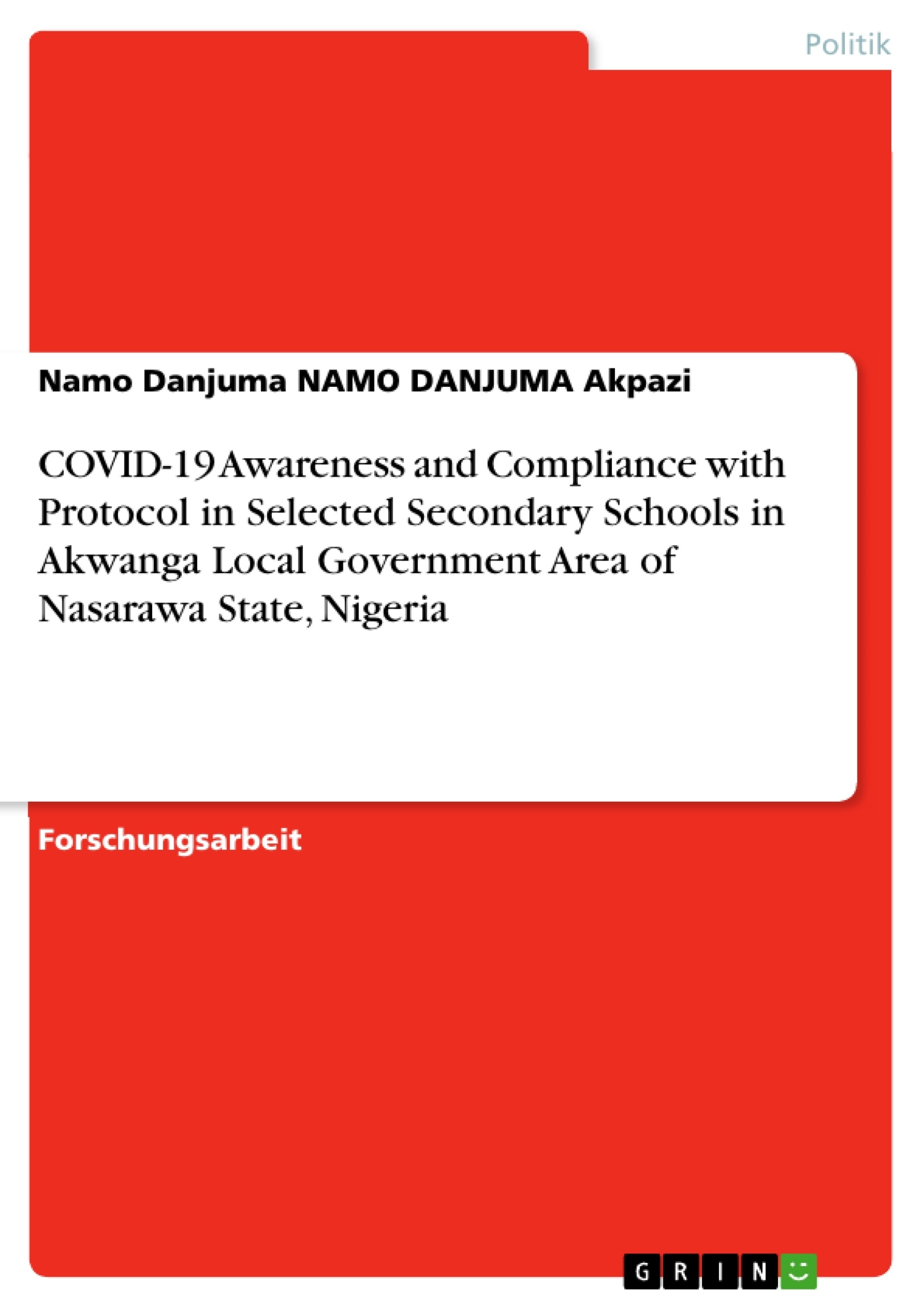Prior to the WHO pronouncement of COVID-19 as a global public health challenge and pandemic, many Nigerians regarded the disease as a distant white man’s infirmity that could never spread to their abode. Without recourse to expert advice and recommendations, Nigerians and their government downplayed the emergence of COVID-19 in their territory thereby hesitating the adoption of initial preventive measures which would have saved costs while protecting the citizenry from undue exposure to the virus. With the confirmation of the index COVID-19 case in Lagos, Nigeria on February 20, 2020, other parts of the country including Akwanga Local Government of Nasarawa state in north-central region continued their normal routines and social activities without observing the sketchy preventive measures initially outlined by Nigeria Centre for Disease Control (NCDC, 2020). The public opinion within Akwanga Local Government Area of Nasarawa state in central Nigeria was that COVID-19 is a “big man disease” (i.e. disease of the highly influential persons). With the low level of education within this region of Nigeria, their immediate conclusion and misinformation on those vulnerable to the disease were expected.
Furthermore, the prevailing presence of urban slums, dense population, inadequate access to potable water, fragile healthcare system, sharing of sanitation facilities with a high degree of social mixing among the inhabitants of Akwanga Local Government Area of Nasarawa state will make the implementation of hygiene and other public health measures necessary for the curbing of the coronavirus impossible. Also, the spread of misinformation and tales regarding the COVID-19 and promotion of unscientific traditional treatment within the Area further jeopardized the implementation of preventive measures.
Based on this background that this study sort to investigates COVID-19 awareness and compliance with protocol in some selected secondary schools in Akwanga Local Government Area of Nasarawa State, Nigeria.
The aim of the study is to investigates COVID-19 awareness and compliance with protocol in some selected secondary schools in Akwanga Local Government Area of Nasarawa State, Nigeria. The objectives of the study is to know whether secondary school students have knowledge about COVID-19 in Akwanga Local Government Area and whether secondary school students in Akwanga Local Government Area comply with the COVID19 protocol.
Inhaltsverzeichnis
- CHAPTER ONE
- INTRODUCTION
- Background to the Study
- Statement of the Problem
- Aim/objectives of the study
- Research Questions
- Statement of Hypothesis
- Significance of the Study
- Scope/Limitation of the Study
- Operational Definition of Terms:
- INTRODUCTION
- CHAPTER TWO
- LITERATURE REVIEW
- Coronavirus and it Origin
- Covid-19
- Causes of Coronaviruses
- Symptoms of Covid-19
- Transmission of Covid-19
- Covid-19 Treatments
- The Possible Complications From Covid-19
- Prevention And Control Of Covid-19
- Covid-19 Vaccines
- The Different Types of Covid-19 Vaccines
- LITERATURE REVIEW
- CHAPTER THREE
- RESEARCH METHODOLOGY
- Introduction
- Research Design
- Population of the Study
- Sample and Sampling Technique
- Research Instrument
- Validity of the Instruments
- Reliability of the Instrument
- Procedure for Data Collection
- Method of Data Analysis
- RESEARCH METHODOLOGY
- CHAPTER FOUR
- DATA PRESENTATION AND ANALYSIS
- Introduction
- Demographic Information of the Respondents
- Data Analysis Based on Covid-19 Awareness and Compliance with Protocol in Secondary School Students
- Summary of Findings
- DATA PRESENTATION AND ANALYSIS
- CHPATER FIVE
- SUMMARY, CONCLUSION, RECOMMEMDATIONS
- Introduction
- Summary
- Conclusion
- Recommendations
- SUMMARY, CONCLUSION, RECOMMEMDATIONS
Zielsetzung und Themenschwerpunkte
Die Studie untersucht das Verhalten von Schülern in Sekundarschulen in Bezug auf die Einhaltung von COVID-19-Richtlinien und -Protokollen. Sie analysiert die Faktoren, die die Compliance beeinflussen, und untersucht, ob die Compliance in Nigeria mit den Maßnahmen zur Eindämmung der Pandemie in anderen Ländern vergleichbar ist.
- COVID-19-Compliance von Sekundarschülern in Nigeria
- Faktoren, die die Compliance beeinflussen
- Vergleich mit ähnlichen Studien in anderen Ländern
- Analyse der Auswirkungen von COVID-19 auf das Bildungssystem
- Bewertung der Wirksamkeit von Präventions- und Kontrollmaßnahmen
Zusammenfassung der Kapitel
- Kapitel 1: Die Einleitung stellt die COVID-19-Pandemie und die Maßnahmen zur Eindämmung der Verbreitung vor. Sie beschreibt die Bedeutung von Compliance-Verhalten und die Problematik der niedrigen Compliance in Nigeria.
- Kapitel 2: Die Literaturrecherche beleuchtet die Entstehung, Verbreitung, Symptome, Behandlung und Prävention von COVID-19.
- Kapitel 3: Die Forschungsmethodik beschreibt die Forschungsdesign, die Stichprobenerhebung, die verwendeten Messinstrumente und die Datenanalysemethoden.
- Kapitel 4: Die Datenpräsentation und -analyse zeigt die Ergebnisse der Studie auf.
Schlüsselwörter
COVID-19, Compliance-Verhalten, Präventions- und Kontrollmaßnahmen, Sekundarschulen, Nigeria, Bildungssystem, Gesundheit, Pandemie, Forschung, Datenanalyse.
- Quote paper
- Namo Danjuma NAMO DANJUMA Akpazi (Author), 2020, COVID-19 Awareness and Compliance with Protocol in Selected Secondary Schools in Akwanga Local Government Area of Nasarawa State, Nigeria, Munich, GRIN Verlag, https://www.grin.com/document/1032911



